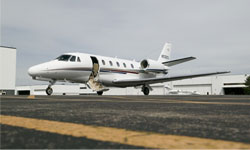 With nearly 300 people in attendance and 89 speakers at the final public hearing on the Large Aircraft Security Program (LASP), Transportation Security Administration officials got an earful about how the proposal would damage general aviation, small business owners, airports, communities, and the economy.
With nearly 300 people in attendance and 89 speakers at the final public hearing on the Large Aircraft Security Program (LASP), Transportation Security Administration officials got an earful about how the proposal would damage general aviation, small business owners, airports, communities, and the economy.
Although the Jan. 28 meeting was held in Houston, Texas, the standing-room-only crowd included participants from as far away as Minnesota, North Carolina, Pennsylvania, Colorado, and New Mexico.
 AOPA Regional Representative Shelly Lesikar deZevallos gave a presentation enumerating the many problems with the LASP proposal, including its fundamental lack of understanding of how general aviation operates and the many layers of security already in place to protect GA. DeZevallos, whose family owns and operates West Houston Airport, told officials how the LASP would cripple GA airports with enormous expenses but provide no real security benefit. She also focused on the fundamental differences between commercial air travel, for which LASP was designed, and privately owned and operated aircraft where pilots hold the keys and fly only people they know.
AOPA Regional Representative Shelly Lesikar deZevallos gave a presentation enumerating the many problems with the LASP proposal, including its fundamental lack of understanding of how general aviation operates and the many layers of security already in place to protect GA. DeZevallos, whose family owns and operates West Houston Airport, told officials how the LASP would cripple GA airports with enormous expenses but provide no real security benefit. She also focused on the fundamental differences between commercial air travel, for which LASP was designed, and privately owned and operated aircraft where pilots hold the keys and fly only people they know.
Other speakers testified about the damage LASP would cause their livelihoods. One cattle rancher described using his aircraft to transport ranch hands and equipment across the vast open spaces of Texas—something that would be impossible if the LASP is adopted in its current form.
The Houston meeting was the last in a series of public hearings held to garner comments on the LASP Notice of Proposed Rulemaking. TSA officials must now consider the comments they heard and determine whether and how to alter the plan.
As written, the LASP would essentially apply commercial air carrier security measures to all GA aircraft weighing more than 12,500 pounds, regardless of how those aircraft are used. Among the requirements would be crewmember criminal record checks, watch list matching of passenger manifests, biennial third party audits of each aircraft operator, and new airport security requirements. AOPA has vigorously argued that the one-size-fits-all approach makes no sense for GA and imposes untenable burdens on operators.
Pilots who did not have an opportunity to attend a public hearing can still file written comments telling the TSA how the plan will affect them. The comment deadline is Feb. 27 and details about how to file as well as more information about the LASP proposal are available online.



